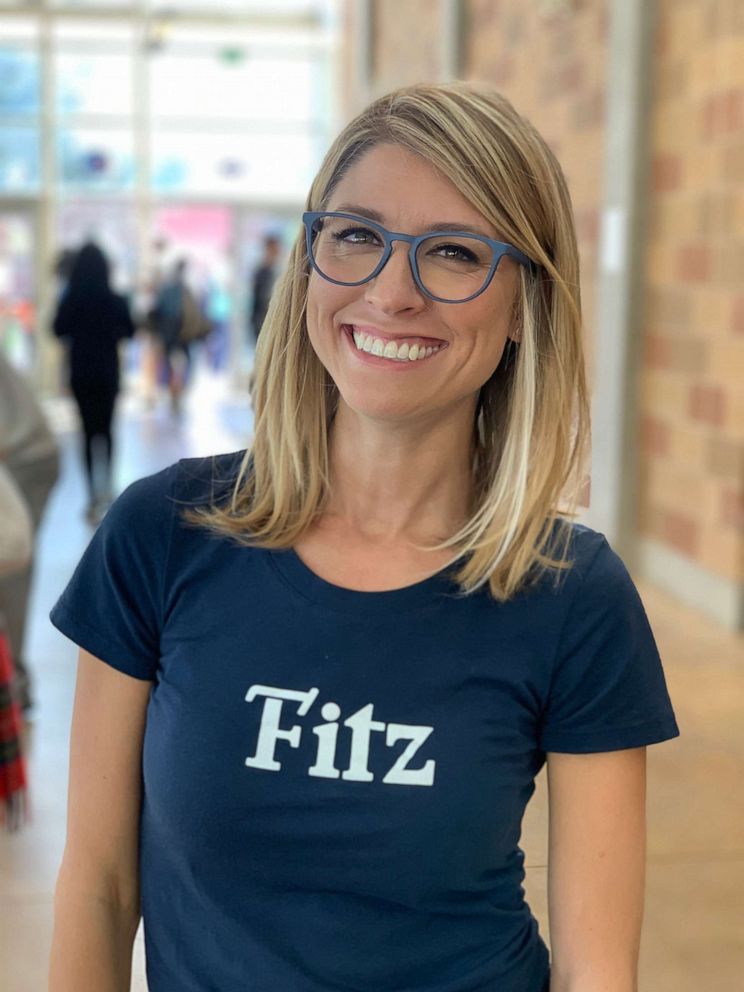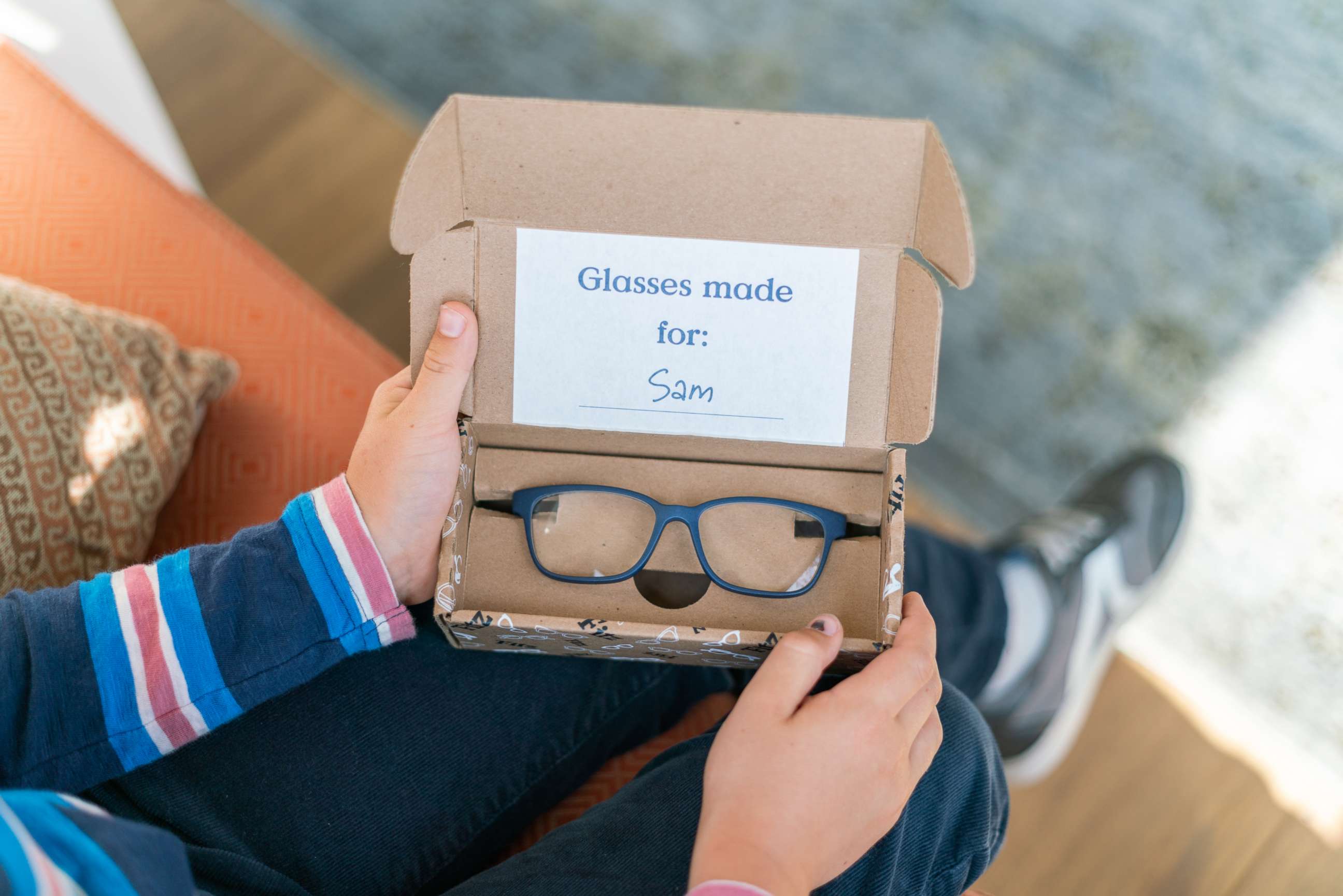Startup offers affordable eyeglasses for kids that 'flatter little faces'
The struggle to find glasses for her daughters led one mom to launch a company.
When Heidi Hertel's daughter was in pre-school, her teacher noticed the child's eyes tracked differently and suggested getting the three-year old’s vision checked.
Neither Hertel nor her husband wore glasses, so the thought hadn't crossed her mind. When she learned her daughter had several underlying conditions that could risk her eyesight if she didn't get corrective lenses, Hertel brought her other daughter, who was just two, to the eye doctor as well.
When she learned that both girls would need glasses, Hertel found herself in tears.
"I felt like I had been a pretty on-top-of-it mom. I knew when to take them to the pediatrician, to the dentist. I had no idea I should also be looking out for their eyes," Hertel told ABC News. "That's when I decided I wanted to help other parents with this."
The teacher's suggestion, and the struggle to get glasses for both of her growing daughters, eventually led to her start a company, Fitz Frames, which launched last week. Frustrated with being unable to find cute and affordable glasses that fit a child's face, Hertel embarked on what would become on a four-year effort to make them herself.

"I didn't like the way a lot of glasses fit kids. The bridge is too heavy, or there are certain angles that are too severe," Hertel said. "So, we really tried to soften everything so it would actually flatter little faces, not just scale down big ones."
"That's the first thing people see when they look at your kid," she said. "And they have to wear them all the time!"
Fitz Frames uses a smartphone app to photograph and measure a child's face and make custom glasses using 3-D printing. Currently, it's only available for iPhones but the company is building an Android app.
The glasses, made of polyamide, or nylon powder, are lighter than most frames. While most eyewear is made in China, Fitz Frames are made in Youngstown, Ohio.
The time between placing an order and having the new glasses in hand is expected to take a week. Currently it is taking two, because of a longer-than-expected pre-launch wait list of over 5,000 orders.
A MOM-MADE BUSINESS
"I never planned on being in the optical business," said Hertel, a lawyer who worked in politics before becoming a stay-at-home mother of three. "Bringing an idea to life, and seeing a real product on actual faces have been an amazing thing."
Being a mom seems to have informed every part of Hertel's decision making.

"I'm trying to make it a less precious thing," she said, noting she had spent about $300 for each pair of glasses for each of her two daughters.
"Kids get really attached to their glasses because they wear them so much," Hertel said. "It's part of their identity, so when they draw themselves, they draw their exact color glasses. They're devastated if something happens to them."
"They either grow out of them or lose them or change their prescription, and you can't get them again because they're discontinued, or you can't size up. Then you have to start the whole process again, which is really inconvenient," she said.
She also noted the guilt children can feel at breaking glasses. One of the most common points of fracture is the tiny screw at the fold, (which can also get lost), so she eliminated them and replaced them with snap fit hinges.
Hertel also wants to de-stigmatize eyeglasses for kids. She wants Fitz Frames to be fun — more like a gift or an accessory — than a burden or reminder of a medical condition.
Each pair comes in an environmentally sustainable box, also made in Youngstown, customized with the child's name. Each frame also comes with the owner's name, or phone number or spirit animal — the kids’ choice — on the inside.
The glasses cost $95 for a pair, of $185 for a subscription that offers two pairs, and then unlimited frames for a year, with a charge for new lenses.
"It’s obviously convenient to have a backup pair and fun to mix and match colors and make fashion statements that way," she said.
KIDS AND OVERLOOKED EYE-CARE
Hertel also hopes that Fitz Frames can help educate parents about vision problems with children.
One in five preschoolers has vision problems, according to the American Optometric Association. In addition, 25% of children will need corrective lenses by the time they enter school.
In the U.S., that translates into 22 to 25 million children under the age of 18 who wear eyeglasses, according to the Vision Council. Yet half of American parents don't take school-age children to the eye doctor, according to VSP Vision Care, one of the largest vision insurance companies in the States.
That carries a big risk, because there are some vision problems, like strabismus and amblyopia, which Hertel's oldest daughter had, which need to corrected early, or risk permanent damage to the child's vision.
"The problem with kids, if they have a problem in an eye and it's not addressed early enough, the connection between the eye and the brain may not form properly," Vicki Chan, an ophthalmologist with Kaiser Permanente in Los Angeles told ABC News. "If you don't correct that by the time they're eight to 10, then that's permanent. The brain turns off that eye, and the eye never develops properly."
That's the first thing people see when they look at your kid. And they have to wear them all the time!
“People always text me and ask me where to get their kids glasses," Chan said. "When kids need glasses, you're going to take them to a regular optometrist, give them a metal or plastic frame and and you're going to spend like $200 to $300, and the kids are going to lose them or outgrow them because they grow so fast."
But the main problem is that children don't wear them.
"They're not comfortable, and they just don't want stuff on their face,” Chan said.
That's the problem Hertel hopes to solve.
Rather than rounding up small kids to take them to the doctor or optometrist and have them sit still for exams and dilated pupils, then schlep to the store, she thought it would be more painless to shop at home, "when everyone's in a better mood."
Plus, she noted, "kids love any excuse to play with a phone."




